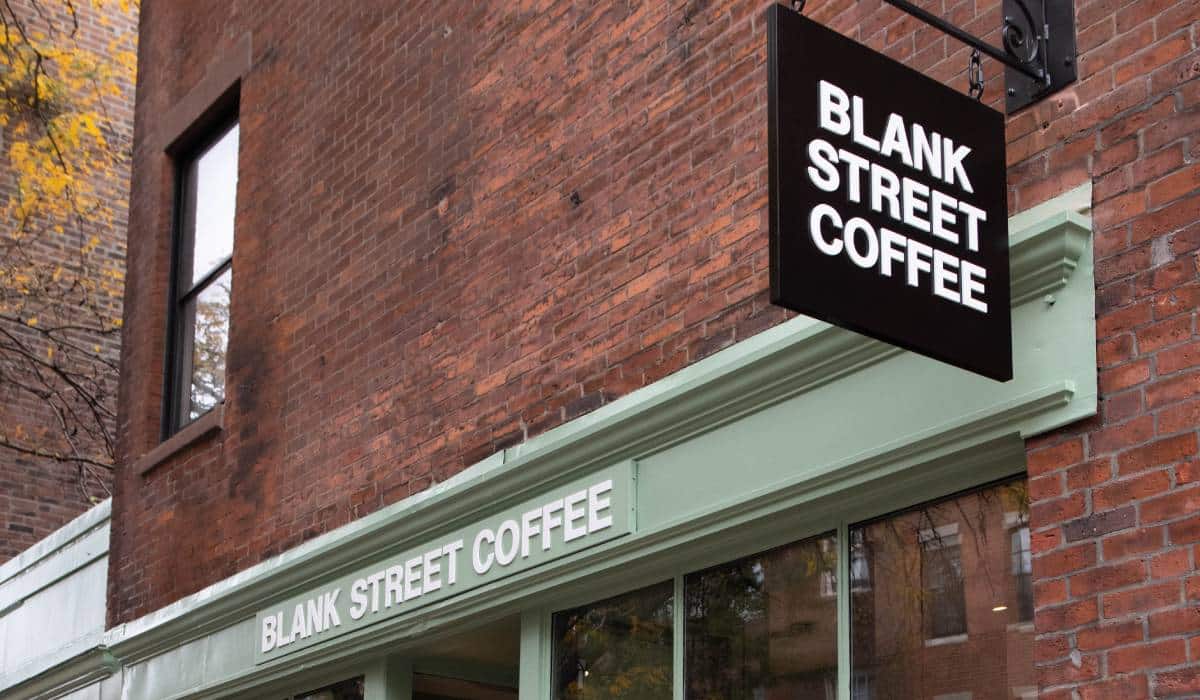It’s hard to argue coffee’s prominence as a habitual commodity. Restaurants chase the high-profit business through frequency and routine. But Vinay Menda saw friction in the blueprint. Some of the sector’s giants had loaded up with complexity and multi-layered menus—something that was bogging service, and, perhaps more notably, resulting in higher-priced items and quick-churning staffs.
Menda was working with Issam Freiha at a venture capital fund in Manhattan when they began plotting the prototype for Blank Street, which the duo viewed as a shop that would underprice Starbucks, offer higher quality than some national brands, and also be more accessible and widespread than independents.
The first units operated solely out of battery-powered carts. This cut costs (enabling lower prices) as Blank Street served coffee from 5-by-10-foot boxes. Locations then began to open in underutilized spaces with a coffee window that were, an average, about half the size of an average Big Apple coffee stop.
Equipment centered on automated Eversys espresso machines that pulled consistent coffee and enabled baristas to spend less time on coffee making and more on hospitality. Blank Street back-ended an app that let customers order in advance and also connected with local vendors to outsource complementary options like milk and pastries.
And the menu? “Instead of having hundreds of items as you would get at a Starbucks or Dunkin’, or even some of these specialty brands that we know and love, we focus on a very simple menu: 15–20 core items,” Menda says. “And as we get bigger and get more scale, we want to focus on increasing the quality of every item on the menu and making the price more accessible for customers.”
He notes some legacy brands have shifted gears from original designs; from automated processes to manual ones (think specialty drinks and the steps involved beyond filling the cup from a machine). It’s a concept that makes sense, Menda says, especially when you consider how large of a business add-ons have become for Starbucks, but it’s simply created a different coffee occasion. Customers still want high-quality, simple products delivered quickly at a price they feel good about multiple times a week, Menda says. “What we found is people really want consistency and for a lot of our customers, that was a more important value proposition,” he says.
The model helped improve employee morale, too, Menda explains. Blank Street offers benefits like mental health support, specific promotion paths, and opportunities to work in HQ. Nearly half its baristas have been referred by existing team members. “By being very simple and automating a lot of the manual things that traditional coffee brands do, we’re able to have a more efficient labor model, both from a visits perspective and also to pay our baristas a lot more than they would make at any other coffee shop,” he says.
Menda and Freiha moved to the U.S. to attend NYC and Columbia, respectively. It’s there they started to look at coffee culture and locate the gaps. Freiha grew up in a world where coffee was mostly consumed at home. NYC’s vendors on every street corner presented both an alluring and expensive case study. If you wanted good coffee, you had to fork up $6 a day for a cappuccino, Menda says, which didn’t fit the college student budget.
After graduating, Menda and Freiha co-founded the venture capital fund mentioned earlier, Reshape, which boasted $100 million of assets under management. They had their eyes on a cluster of high-growth, mobile-first, food-retail businesses making waves in Asia, such as Kopi Kenangan in Indonesia, and the Chinese brand Heytea. Both achieved growth by selling high-quality coffee and tea from tiny retail spaces.
“We realized the opportunity in the U.S. was quite greenfield,” Menda said at the time.
In October 2021, Blank Street raised $25 million in a round led by General Catalyst and Tiger Global, along with additional strategic investors including Neil Blumenthal and Dave Gilboa (founders, Warby Parker), Jeff Raider (founder, Warby Parker and Harry’s), Joey Zwillinger (founder, Allbirds), and global real estate firm Tishman Speyer. Following a $7 million seed raise earlier that year, Blank Street was now leveraged to expand.
The funding also spurred the launch of “Powered By Blank Street,” a wholesale partnership created to empower local vendors to sell in new neighborhoods, a deal that began with Brooklyn-based King David Tacos serving breakfast items alongside Blank Street’s coffee and teas.
From its founding in summer 2020 to now, Blank Street has opened 42 New York City locations, with units in Boston and London as well. And it most recently dropped two stores into Washington, D.C.—one in Dupont and another in Shaw. Menda sees room for 10–12 D.C. units in time; double-digits by the end of next year. Blank Street connected with Fresh Baguette for savory and sweet pastries and Green Almond Pantry for focaccia bread.
The decision to expand to D.C. was rooted in the market’s coffee appetite and frantic pace. “We really thought D.C. was a place craving high-quality product but in a more convenient fashion than what’s out there today,” Menda says. To boot, a good deal of Blank Street’s corporate employees went to school in the area and approached the growth with a sense of real estate.
That’s another anchor of Blank Street’s potential: the company’s road map, from day one, has included hiring executive from concepts like Bluestone Lane and Paris Baguette.
Menda says Blank Street plans to go step-by-step from here. It wants to focus on current markets and saturate areas to broaden accessibility. Essentially, to become one-stop shops for people who want high-quality, affordable coffee every day.
The company “might” open in another American city next year, but Menda isn’t sure where yet. “We have a few ideas in mind,” he says. Further European growth could be on deck as well. “It feels very early to tell,” Menda adds. “But we have a lot of opportunity ahead of us.

